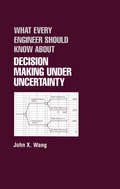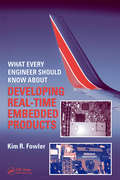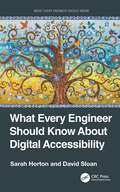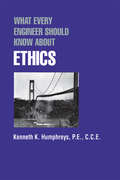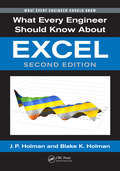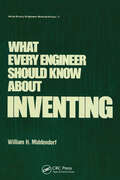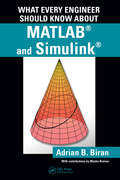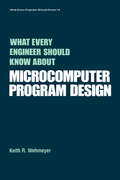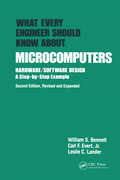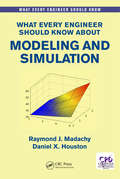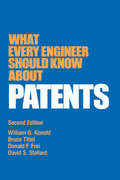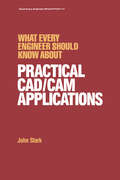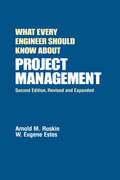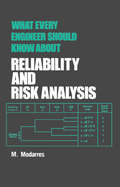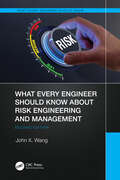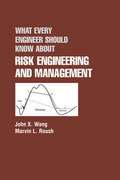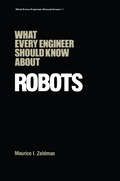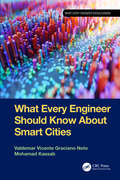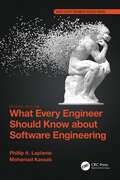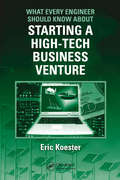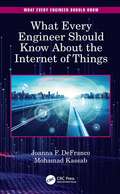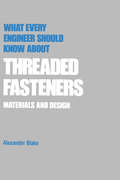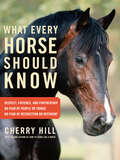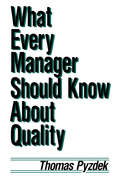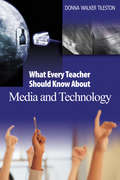- Table View
- List View
What Every Engineer Should Know About Decision Making Under Uncertainty
by John X. WangCovering the prediction of outcomes for engineering decisions through regression analysis, this succinct and practical reference presents statistical reasoning and interpretational techniques to aid in the decision making process when faced with engineering problems. The author emphasizes the use of spreadsheet simulations and decision trees as important tools in the practical application of decision making analyses and models to improve real-world engineering operations. He offers insight into the realities of high-stakes engineering decision making in the investigative and corporate sectors by optimizing engineering decision variables to maximize payoff.
What Every Engineer Should Know About Developing Real-Time Embedded Products (What Every Engineer Should Know)
by Kim R. FowlerYou can find them in your wristwatch or MP3 player; they perform specific functions in washing machines, traffic lights, and even pacemakers. Embedded systems are pervasive, ubiquitous, and widespread throughout our daily lives. Developing these real-time embedded products requires an understanding of the interactions between different disciplines,
What Every Engineer Should Know About Digital Accessibility (ISSN)
by Sarah Horton David SloanAccessibility is a core quality of digital products to be deliberately addressed throughout the development lifecycle. What Every Engineer Should Know About Digital Accessibility will prepare readers to integrate digital accessibility into their engineering practices. Readers will learn how to accurately frame accessibility as an engineering challenge so they are able to address the correct problems in the correct way.Illustrated with diverse perspectives from accessibility practitioners and advocates, this book describes how people with disabilities use technology, the nature of accessibility barriers in the digital world, and the role of engineers in breaking down those barriers. Accessibility competence for current, emerging, and future technologies is addressed through a combination of guiding principles, core attributes and requirements, and accessibility‑informed engineering practices.FEATURES Discusses how technology can support inclusion for people with disabilities and how rigorous engineering processes help create quality user experiences without introducing accessibility barriers Explains foundational principles and guidelines that build core competency in digital accessibility as they are applied across diverse and emerging technology platforms Highlights practical insights into how engineering teams can effectively address accessibility throughout the technology development lifecycle Uses international standards to define and measure accessibility quality Written to be accessible to non‑experts in the subject area, What Every Engineer Should Know About Digital Accessibility is aimed at students, professionals, and researchers in the field of software engineering.
What Every Engineer Should Know about Ethics (What Every Engineer Should Know)
by Kenneth K. HumphreysThis compact reference succinctly explains the engineering profession's codes of ethics using case studies drawn from decisions of the National Society of Professional Engineers' Board of Ethical Review, examining ethical challenges in engineering, construction, and project management. It includes study questions to supplement general engineering survey courses and a list of references to aid practicing engineers in exploring topics in depth. The author discusses recent headline-making disasters such as the Challenger explosion and the Chernobyl nuclear catastrophe; considers the merits and drawbacks of professional codes of ethics; and outlines legal standards for liability.
What Every Engineer Should Know About Excel (What Every Engineer Should Know #50)
by J. P. Holman Blake K. Holman<p>Understanding the powerful computational and graphics capabilities of Microsoft Excel is an enormous benefit to engineers and technical professionals in almost any field and at all levels of experience. What Every Engineer Should Know About Excel is a practical guide to unlocking the features and functions of this program, using examples and screenshots to walk readers through the steps to build a strong understanding of the material. <p>This second edition is updated to reflect the latest version of Excel (2016) and expands its scope to include data management, connectivity to external data sources, and integration with "the cloud" for optimal use of the Excel product. It also introduces the ribbon bar navigation prevalent in Microsoft products beginning with the 2007 version of MS Office. Covering a variety of topics in self-contained chapters, this handy guide will also prove useful for professionals in IT, finance, and real estate.</p>
What Every Engineer Should Know about Inventing
by William H. MiddendorfThis book provides the reader with the information they need to develop into a person who seeks creative opportunities and responds with elegant inventions. It is intended for young inventor and to all those who have the talent and the desire to invent.
What Every Engineer Should Know about MATLAB and Simulink (ISSN)
by Adrian B. BiranUsing examples from mathematics, mechanical and electrical engineering, and control and signal processing, this book provides an introduction to MATLAB and Simulink and examines the advantages and limitations of both. The author demonstrates how to visualize the results of calculations in various kinds of graphical representations, how to write useful script files and functions for solving specific problems, how to avoid disastrous, computational errors, and how to insert calculations and graphs into technical reports produced by either MS Word or LaTeX. Companion software with functions and script files are available online.
What Every Engineer Should Know about Microcomputer Software
by Keith A. WehmeyerThis book covers the entire scope of computer programming and Structured Program Design, from problem identification to maintaining existing programs. It is intended for two audiences: beginning programmers and experienced programmers seeking ways to improve the quality of their software.
What Every Engineer Should Know about Microcomputers: Hardware/Software Design: a Step-by-step Example, Second Edition,
by William S. Bennett Carl F. Evert Jr. Leslie C. LanderRevised and expanded guide demonstrates microcomputer usage by working through one simple design challenge and explaining its solution. This edition features the contributions of an Ada expert, demonstrates (in 14 new chapters) the development of a microcomputer system structured by this language.
What Every Engineer Should Know About Modeling and Simulation (What Every Engineer Should Know)
by Raymond J. Madachy Daniel HoustonThis practical book presents fundamental concepts and issues in computer modeling and simulation (M&S) in a simple and practical way for engineers, scientists, and managers who wish to apply simulation successfully to their real-world problems. It offers a concise approach to the coverage of generic (tool-independent) M&S concepts and enables engineering practitioners to easily learn, evaluate, and apply various available simulation concepts. Worked out examples are included to illustrate the concepts and an example modeling application is continued throughout the chapters to demonstrate the techniques. The book discusses modeling purposes, scoping a model, levels of modeling abstraction, the benefits and cost of including randomness, types of simulation, and statistical techniques. It also includes a chapter on modeling and simulation projects and how to conduct them for customer and engineer benefit and covers the stages of a modeling and simulation study, including process and system investigation, data collection, modeling scoping and production, model verification and validation, experimentation, and analysis of results.
What Every Engineer Should Know about Patents
by William G. Konold"This useful, authoritative volume focuses on all aspects of intellectual property law with particular emphasis on patent laws enabling the reader to avoid such pitfalls as a loss of rights, and establish valid rights in inventions, trademarks, and writings. "
What Every Engineer Should Know about Practical Cad/cam Applications
by John StarkThis book presents basic information on CAD/CAM and describes how to select, implement, and run a CAD/CAM system in the mechanical engineering environment. It also describes the overall state of CAD/CAM today in different industrial sectors and for different manufacturing technologies.
What Every Engineer Should Know About Project Management
by Arnold M. Ruskin W. Eugene EstesCovering the roles and responsibilities of the project manager, this second edition describes requirement specifications, work breakdown structures, project control and risk management, and offers new information on motivation, matrix arrangements, and project records. Discussing the anatomy of a project planning and control and techniques, the aut
What Every Engineer Should Know about Reliability and Risk Analysis (What Every Engineer Should Know #30)
by Mohammad Modarres"Examining reliability, availability, and risk analysis and reviewing in probability and statistics essential to understanding reliability methods, this outstanding volume describes day-to-day techniques used by practicing engineers -- discussing important reliability aspects of both components and complex systems. "
What Every Engineer Should Know About Risk Engineering and Management (ISSN)
by John X. WangCompletely updated, this new edition uniquely explains how to assess and handle technical risk, schedule risk, and cost risk efficiently and effectively for complex systems that include Artificial Intelligence, Machine Learning, and Deep Learning. It enables engineering professionals to anticipate failures and highlight opportunities to turn failure into success through the systematic application of Risk Engineering. What Every Engineer Should Know About Risk Engineering and Management, Second Edition discusses Risk Engineering and how to deal with System Complexity and Engineering Dynamics, as it highlights how AI can present new and unique ways that failures can take place. The new edition extends the term "Risk Engineering" introduced by the first edition, to Complex Systems in the new edition. The book also relates Decision Tree which was explored in the first edition to Fault Diagnosis in the new edition and introduces new chapters on System Complexity, AI, and Causal Risk Assessment along with other chapter updates to make the book current. Features Discusses Risk Engineering and how to deal with System Complexity and Engineering Dynamics Highlights how AI can present new and unique ways of failure that need to be addressed Extends the term "Risk Engineering" introduced by the first edition to Complex Systems in this new edition Relates Decision Tree which was explored in the first edition to Fault Diagnosis in the new edition Includes new chapters on System Complexity, AI, and Causal Risk Assessment along with other chapters being updated to make the book more current The audience is the beginner with no background in Risk Engineering and can be used by new practitioners, undergraduates, and first-year graduate students.
What Every Engineer Should Know About Risk Engineering and Management (ISSN #Vol. 36)
by John X. Wang Marvin L. Roush"Explains how to assess and handle technical risk, schedule risk, and cost risk efficiently and effectively--enabling engineering professionals to anticipate failures regardless of system complexity--highlighting opportunities to turn failure into success."
What Every Engineer Should Know about Robots (What Every Engineer Should Know)
by Maurice I. ZeldmanThis book summarizes the technology and economics of robotics. It aims to provide sufficient data background so that the technologists can help in deciding about a corporate investment in robotics.
What Every Engineer Should Know About Smart Cities (What Every Engineer Should Know)
by Valdemar Vicente Neto Mohamad KassabGet ready to be at the forefront of the future of urban development! As cities continue to rapidly grow, the demand for sustainable and efficient infrastructure becomes more urgent. That’s where What Every Engineer Should Know About Smart Cities comes in, offering a comprehensive guide to the concepts and technologies driving the transformation of our cities. Delve into the world of smart cities and discover how information and communication technologies are revolutionizing urban environments. With clear definitions and a focus on real-world applications, this book explores the benefits and challenges of smart cities. It also highlights interdisciplinary topics such as smart buildings, autonomous cars, and urban emergency management systems. This book is not just a theoretical exploration of smart cities. It goes beyond that by providing an in-depth look at the key technologies that are essential to creating smart cities. From the Internet of Things and blockchain to digital twins and modeling and simulations, readers will gain a solid understanding of the foundational technologies that make smart cities possible. With detailed discussions and real-world examples of smart mobility, smart health, smart education, and smart agribusiness, readers will gain a deep understanding of the requirements and characteristics that engineers need to contribute to the development of smart cities. Whether you’re an engineer looking to expand your knowledge, a city planner seeking to understand the latest trends, or simply someone interested in the future of urban living, What Every Engineer Should Know About Smart Cities is the ultimate guide to unlocking the potential of smart cities for sustainable urban development and improved quality of life.
What Every Engineer Should Know about Software Engineering (What Every Engineer Should Know)
by Phillip A. Laplante Mohamad KassabThis book offers a practical approach to understanding, designing, and building sound software based on solid principles. Using a unique Q&A format, this book addresses the issues that engineers need to understand in order to successfully work with software engineers, develop specifications for quality software, and learn the basics of the most common programming languages, development approaches, and paradigms. The new edition is thoroughly updated to improve the pedagogical flow and emphasize new software engineering processes, practices, and tools that have emerged in every software engineering area. Features: Defines concepts and processes of software and software development, such as agile processes, requirements engineering, and software architecture, design, and construction. Uncovers and answers various misconceptions about the software development process and presents an up-to-date reflection on the state of practice in the industry. Details how non-software engineers can better communicate their needs to software engineers and more effectively participate in design and testing to ultimately lower software development and maintenance costs. Helps answer the question: How can I better leverage embedded software in my design? Adds new chapters and sections on software architecture, software engineering and systems, and software engineering and disruptive technologies, as well as information on cybersecurity. Features new appendices that describe a sample automation system, covering software requirements, architecture, and design. This book is aimed at a wide range of engineers across many disciplines who work with software.
What Every Engineer Should Know About Starting a High-Tech Business Venture (What Every Engineer Should Know)
by Eric KoesterWritten by an experienced business lawyer in the technology, scientific and engineering community, this publication is for the engineer with an innovative high-tech idea or concept who needs those crucial business insights and strategies to move that idea forward. It offers key analysis on how to leave a current employer, gain access to technologie
What Every Engineer Should Know About the Internet of Things (What Every Engineer Should Know)
by Joanna F. DeFranco Mohamad KassabInternet of Things (IoT) products and cyber-physical systems (CPS) are being utilized in almost every discipline and there continues to be significant increases in spending on design, development, and deployment of IoT applications and analytics within every domain, from our homes, schools, government, and industry. This practical text provides an introduction to IoT that can be understood by every engineering discipline and discusses detailed applications of IoT. Developed to help engineers navigate this increasingly important and cross-disciplinary topic, this work: Offers research-based examples and case studies to facilitate the understanding of each IoT primitive Highlights IoT’s connection to blockchain Provides and understanding of benefits and challenges of IoT and its importance to a variety of engineering disciplines Written to be accessible to non-experts in the subject, What Every Engineer Should Know About the Internet of Things communicates the importance of this technology and how it can support and challenge all interrelated actors as well as all involved assets across many domains.
What Every Engineer Should Know about Threaded Fasteners: Materials and Design (What Every Engineer Should Know)
by Alexander BlakeThis valuable reference presents a considerable body of materials knowledge distilled from the leading industrial institutions' practical experience in developing and improving threaded fasteners, introducing engineers to the selection, procurement and quality control of fasteners. It gives elementary design formulas for fastener sizing, properties and sample calculations. Illustrated with tables and drawings, this volume is an important reference for any mechancial, design, manufacturing, automotive and aerospace engineers, technologists and technicians; fastener manufacturers and sales personnel, under graduate-level coureses in manufacturing and mechanical engineering and industry in-house training courses in fastener design and manufacture.
What Every Horse Should Know: A Training Guide to Developing a Confident and Safe Horse
by Cherry HillTrain your horse to embrace a life around humans. Focusing on developing the skills vital for every domesticated horse, this guide stresses the importance of creating an atmosphere where both trainer and horse can overcome fear and cultivate mutual respect. With a series of tests to gauge your horse’s knowledge and training exercises to enrich and strengthen your horse’s comfort around people, you can increase attentiveness, boost confidence, and help your horse reach his full potential.
What Every Manager Should Know about Quality
by Thomas Pyzdek"Offers an accessible account of quality control and features forms, worksheets, and step-by-step procedures that simplify statistical process control - showing how to build a business that will thrive in today's economy. "
What Every Teacher Should Know About Media and Technology
by Donna E. TilestonTechnology plus classroom can equal success for students. This invaluable resource for teachers presents classroom applications of media, technology, and the Internet.
